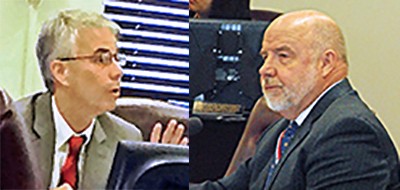
- JB
- Mulroy (l), Holden during Wednesday’s budget session
Since assuming his position in 2009 in the aftermath of the 2008 election that formally made the Republican Party as the majority party in Tennessee, Republican Holden has endured numerous criticisms, purge attempts, official rebukes, and votes of No Confidence, at least one of which, coming from the Shelby County Commisision last year, originated from a member of his own party.
All this on account of a series of well-publicized glitches in the course of several local elections. Whatever the degree of his responsibility, Holden, as Administrator, is where the buck stops.
And yet, like those watches in the old Timex ads, the Stoical ex-Marine takes a licking and keeps on ticking.
He got more of the same, though in lesser quantities, from members of the County Commission during his presentation Wednesday of the annual budget request for the Election Administrator’s office. Holden was seeking an add-on appropriation to pay for five additional staffers — all needed, he said, to comply with recommendations made in a county audit last November.
HAVA funds and early voting
Responses of the commissioners to the employee request ranged from non-committal to skeptical, but other issues, left over from controversies of the past, dominated the discussion.
Commissioner Steve Mulroy began things by asking Holden to confirm that the Election Commission had in the past made a formal request to the state for funds to purchase Opti-Scan election machines for Shelby County and that Help America Vote Act (HAVA) funding was still available for that purpose .
Pointedly, Mulroy said he had had a conversation with Election Commission chairman Robert Meyer earlier Wednesday and that Meyer had expressed no opposition to a renewed request for such funding, which had been authorized statewide by the General Assembly in 2008 but subsequently delayed and then canceled by a GOP-dominated legislature.
Next up was Commissioner Mike Ritz, who first ascertained from County CAO Harvey Kennedy that the increases sought by Holden had not been included in County Mayor Mark Luttrell’s proposed $1.16 billion budget and then went on to verify from Holden that the Election Commission had diminished the active period for early voting satellite sites from the the level of four years ago.
Commissioner Terry Roland,a Republican like Ritz but one far more attuned to the party line, was next with reassuring words for the Administrator. Roland applauded the reductions, saying that he had served as an election inspector in the years before the satellite hours were reduced and that “voter participation was slow it was not responsible to continue” at that level.
“Better off just setting a pile of money on fire”
Roland was followed by Commissioner Steve Basar, a Republican, too, but more trouble. He asked about graphic ads that had recently appeared in The Commercial Appeal, outlining the contours of the 13 new County Commission districts. “Yes,” said Holden, adding eagerly that School Board maps would be coming soon.
As it turned out, Basar was no fan of the CA maps. “They’re not very helpful. They’re hard to see.” Holden pointed out that the same maps were also available at the Commission’s online site, where they could be zoomed in on.
That was fine, answered Basar, but, as for those newspaper ads, “You’d have been better off just setting a pile of money on fire.”
Nor was Basar done. He chastised Holden about the barriers in the Election Commision office. “They’re intimidating. You should take them down where people are going to register to vote.”
There was more of the same. Commissioner Sidney Chism, the vintage inner city Democrat, complained about the fact that, for the first half of the early voting period, only the downtown Commission office was available for the purpose. That was a “hindrance,” he said, hard on poor people and old folks.
Next was Mark Billingsley, a Germantown Republican who had filled a vacancy and was now running in his first election. Working with the line item sheet that all Commissioners had received, he noted that the five new positions sought by Holden totaled some $266,00, and he wondered why they were needed.
Some, of the clerical sort, were in response to the critical November audit, Holden said. Other were replacements for personnel shifted over to the John Halbert’s relatively new county IT department, and one was to allow the Administrator’s office to do a better job of informing the public.
Wasn’t outreach and information part of Holden’s own responsibility, Billingsley asked. Holden agreed, but said his duties were such that he couldn’t devote proper time to that aspect of things.
Now came Henri Brooks, always anxious to make sure that public funds were spent according to the non-discrimination provisions of Title VI of the 1964 Civil Rights Act and wondering if the new P.R. position billeted by Holden and assigned to freelancer Suzanne Thompson had been properly advertised.
It wasn’t a contract position, Holden answered. Thompson was a vendor and was paid on an hourly basis. He and Brooks fenced on the point for some time, with Brooks concluding that “no one else had a chance to apply” and asking for more information on Thompson and the position.
The session was being rushed somewhat by Budget Committee chair Heidi Shafer, who wanted to stay on clock, and Brooks yielded to a reprise from Mulroy, who wanted to know if Holden was still trying, as had been frequently reported, to blame the erroneous precinct lines of the 2012 August election on the Commission’s overtime efforts to come up with a redistricting plan.
Mulroy made the frequently cited point that the new Commission districts would not be in effect until the 2014 election cycle and that therefore precinct assignments for August 2012 should not have been held up waiting for a Commission redistricting plan.
Holden made several efforts to deny that he was still blaming, or had ever blamed, the electoral glitches of 2012 on repeated delays in the Commission’s redistricting efforts but acknowledged that, in his judgment, they had been a contributing factor. But Mulroy extracted a pledge from Holden that the Administrator would never again suggest that the 2012 glitches derived from any delay on the County Commission’s part.
Inquiry about FBI matter on hold
Mulroy next attempted to ask Holden about reports that the FBI had begun an investigation focused on the Election Commission and the Administrator’s office but was forestalled by Shafer, who said that the matter was extraneous to the budget discussion and should be considered in a later, separate meeting, yet to be scheduled.
After Commissioner Melvin Burgess had asked a question as to whether all the audit issues had been addressed in Holden’s staff requests and was assured that they had been, County Attorney Marcy Ingram intervened to say that the area of Mulroy’s concern was a matter of ongoing criminal investigation and was therefore off limits to discussion. Mulroy indicated that he would pursue the matter further.
The final act in Wednesday’s mini-drama belonged to Norma Lester, one of two Democrats on the five-member Election Commission and a frequent Holden adversary. Now she would testify that it was time for the Administrators office to be frugal and that there was “no need” to add the five positions asked for by Holden — not, as she would explain later in a note to this writer, “when there are 3 vacancies, one of which has been vacant well over a year and the other two almost a year.”
“[T]here are 12 people including the Administrator employed at the Commission, 4 of which are management. Requesting an assistant for a manager who only supervises 5 people is not frugal,” Lester, who sees herself not as a political opponent but as an exponent of efficient administration, elaborated int he note.
Wednesday’s session, which took more than 40 minutes but must have seemed longer to Rich Holden, would then end, but all of this is to be continued.






